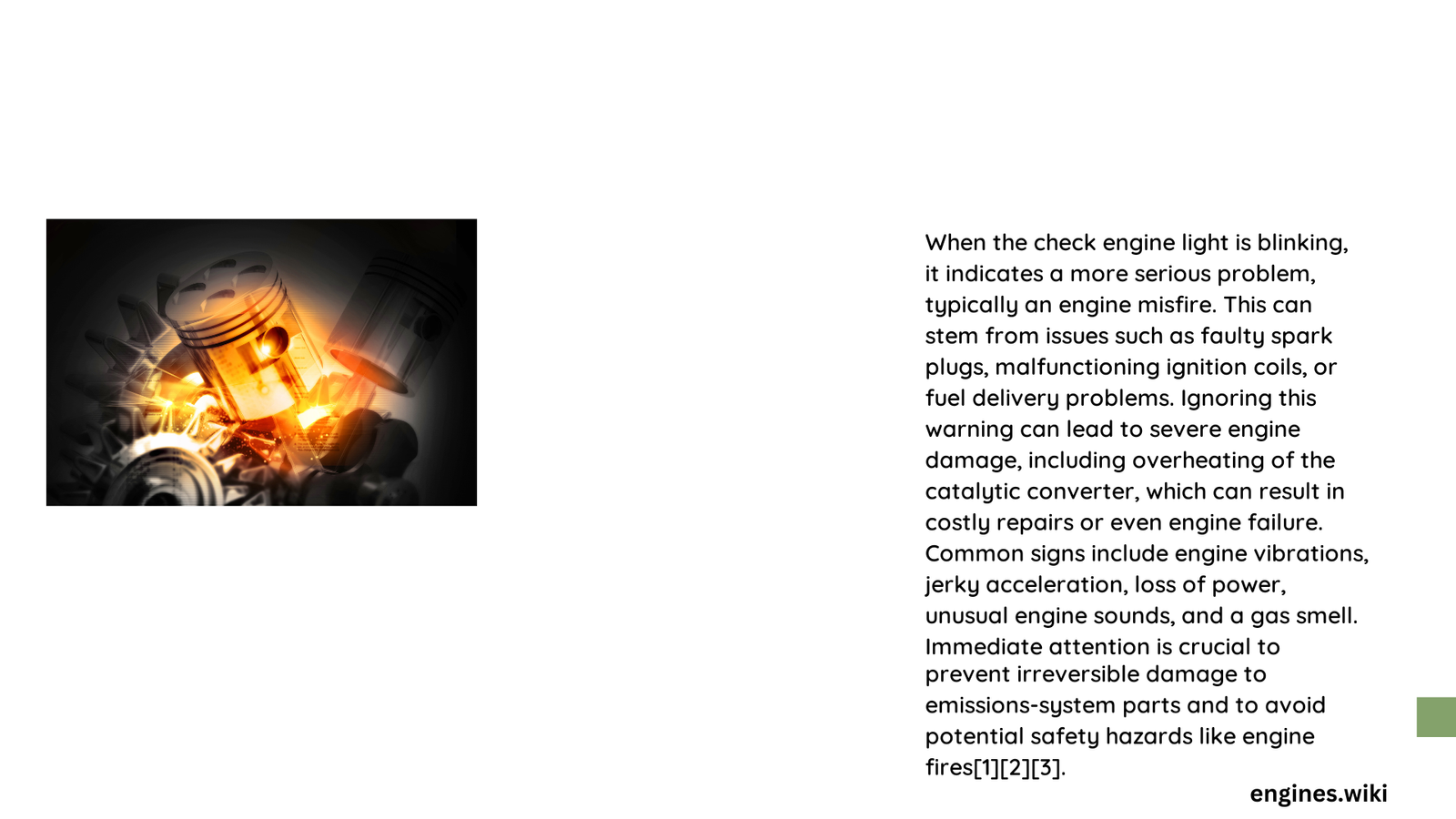A blinking check engine light is not just a warning—it’s an urgent signal of potentially catastrophic engine damage. Unlike a steady check engine light, a blinking indicator means your vehicle is experiencing severe misfires that could destroy expensive engine components within minutes. Immediate professional diagnostic assessment and repair are crucial to prevent total engine failure, costly replacements, and dangerous driving conditions.
What Causes a Blinking Check Engine Light?
Why Do Engine Misfires Trigger Blinking Warnings?
Engine misfires represent the primary reason for a blinking check engine light. These misfires occur when one or more engine cylinders fail to fire correctly, causing significant performance disruptions and potential long-term damage.
Key Misfire Indicators
- Rough engine idle
- Reduced acceleration
- Decreased fuel efficiency
- Unusual engine vibrations
What Specific Diagnostic Trouble Codes (DTCs) Signal Serious Problems?
| DTC Code | Problem Description | Potential Repair Cost |
|---|---|---|
| P0300 | Random/Multiple Cylinder Misfire | $200 – $600 |
| P0316 | Startup Misfire Detection | $150 – $500 |
| P0301-P0304 | Individual Cylinder Misfires | $100 – $400 per cylinder |
How Quickly Can Misfires Cause Permanent Damage?
Continuous misfires can rapidly deteriorate critical engine components:
- Spark Plug Damage: Within 100-500 miles
- Catalytic Converter Failure: 1-3 months of persistent misfires
- Potential Engine Rebuild: 6-12 months if left unaddressed
What Are the Most Common Misfire Causes?

Can Faulty Ignition Components Trigger Blinking Lights?
Ignition system failures frequently cause check engine light warnings:
- Worn spark plugs
- Damaged ignition coils
- Malfunctioning spark plug wires
- Compromised fuel injectors
How Expensive Are Potential Repairs?
Repair costs escalate quickly when misfires are ignored:
- Spark plug replacement: $100 – $300
- Ignition coil replacement: $50 – $250 per coil
- Fuel injector repair: $300 – $800
- Catalytic converter replacement: $500 – $2,500
What Should Drivers Do Immediately?
How to Respond When Check Engine Light Blinks?
- Reduce driving speed
- Avoid high-performance driving
- Schedule immediate professional diagnostic
- Do not continue extended driving
- Use OBD-II scanner for preliminary code reading
What Long-Term Risks Exist?
Can Ignored Misfires Destroy an Engine?
Persistent misfires can cause:
– Irreversible cylinder wall damage
– Catalytic converter destruction
– Oxygen sensor failure
– Potential complete engine replacement
Expert Recommendations
What Do Professional Mechanics Advise?
- Never ignore a blinking check engine light
- Treat it as an emergency automotive situation
- Seek professional diagnostic within 24-48 hours
- Understand that immediate action prevents exponential damage costs
Technical Insights
How Do Modern Vehicles Detect Misfires?
Modern vehicles use sophisticated sensors and computer systems to:
– Monitor individual cylinder performance
– Track combustion efficiency
– Detect minute performance variations
– Generate precise diagnostic trouble codes
Reference:
– SAE International Automotive Diagnostics Research
– ASE Certified Mechanics Guidelines
– National Institute for Automotive Service Excellence
